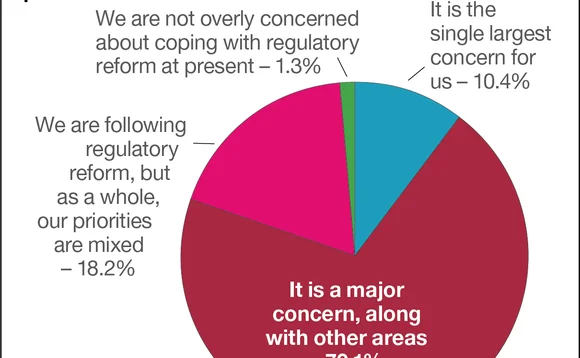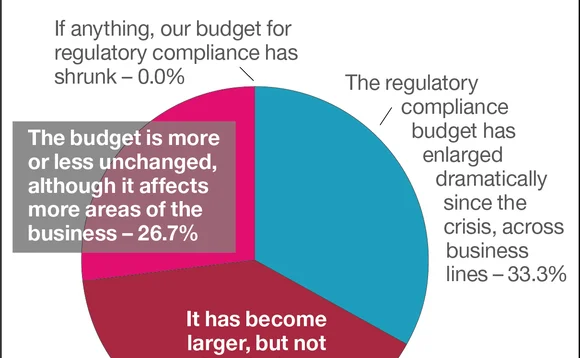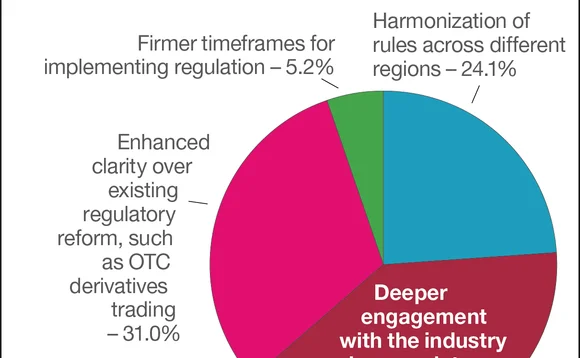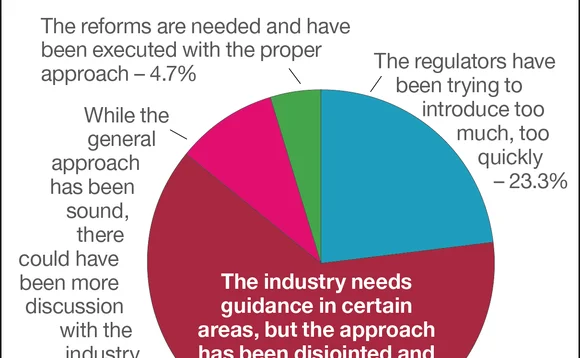Regulation Webcast: Risk and Reward




TOPICS COVERED BY THE WEBCAST:
- The ways in which firms are challenged by the frequency of new regulation, and the number of different directions it is coming from, along with short timeframes for compliance.
- The role of technology in managing this global reform, from swaps reform through to market surveillance and other areas.
- Managing the risk of regulatory arbitrage, and debating questions over more harmonized approaches to global regulation.
- How vendors, institutions and regulators can work more closely with one another to reduce the risks inherent in non-compliance, particularly in fragmented regulatory environments such as the ones international firms operate in.
On a global basis, financial firms are being buffeted by the winds of change. The US financial sector is experiencing the widest reform since the Great Depression on the back of the Dodd–Frank Act, while those operating in Europe are dealing with the review of the Markets in Financial Instruments Directive (Mifid II). For international firms, questions of managing reform and the potential for regulatory arbitrage present significant challenges to the way in which they operate, as borne out by discussions in a recent Waters webcast, which explored the ways in which businesses can navigate the intensity of regulation after the financial crisis of 2008.
Moderated by James Rundle, deputy editor, sell side, of Waters, panelists included Nick Green, head of fixed-income markets e-business at Crédit Agricole; Alan Eddie, head of risk IT Americas, global head of regulatory risk and operational risk IT at RBS; Bill Nosal, head of business development and product strategy for Smarts Broker at Nasdaq OMX; and Ed Royan, COO at AxiomSL, EMEA.
Risk Elements
Although the primary objective of macro-regulation such as Dodd–Frank and Mifid II is the reduction of systemic risk, panelists debated the question of whether this new landscape, and both the frequency and direction of new regulation, were actually introducing new elements of risk, given the stiff penalties for breaches and the often short timeframes in which to ensure compliance.
“The scale of reform we’re seeing across the world is without precedent. Just look at Dodd–Frank, a prime example of large-scale reform,” RBS’ Eddie says. “It’s always risky, and particularly so when the whole industry has to do it at the same time—it’s not just one firm that has to change.”
“The scale of reform we’re seeing across the world is without precedent. Just look at Dodd–Frank, a prime example of large-scale reform. It’s always risky, and particularly so when the whole industry has to do it at the same time – it’s not just one firm that has to change.” Alan Eddie, RBS
According to Eddie, simply keeping track of what regulation was coming from where, and when regulators expected compliance, was a significant challenge. Others say this was mainly a capacity problem, and although the immediate commercial benefits of increasing compliance capacity aren’t readily apparent, some firms are actively exploring ways in which their compliance procedures and ability to adapt to regulation can be a competitive differentiator.
Carrot and Stick
The panelists say that although the burden of regulatory change is relentless, there are some benefits. Requirements under Dodd–Frank for certain institutions to centrally clear interest-rate swaps on March 11, for instance, went smoothly in part due to vendors having their systems in place to handle the new method of trading, while other regulatory reforms around derivatives transactions potentially offer new areas of growth.
“There is risk inherent in the scale and the pace of the change,” says Crédit Agricole’s Green. “But on the other hand, there are opportunities. Central clearing gives a tremendous opportunity for many of the dealers to expand the range of clients they deal with, and by reducing the risk between the counterparties, it gives the potential for that asset class to be used a lot more extensively and to be a lot more attractive to users over time.”
Only users who have a paid subscription or are part of a corporate subscription are able to print or copy content.
To access these options, along with all other subscription benefits, please contact info@waterstechnology.com or view our subscription options here: https://subscriptions.waterstechnology.com/subscribe
You are currently unable to print this content. Please contact info@waterstechnology.com to find out more.
You are currently unable to copy this content. Please contact info@waterstechnology.com to find out more.
Copyright Infopro Digital Limited. All rights reserved.
As outlined in our terms and conditions, https://www.infopro-digital.com/terms-and-conditions/subscriptions/ (point 2.4), printing is limited to a single copy.
If you would like to purchase additional rights please email info@waterstechnology.com
Copyright Infopro Digital Limited. All rights reserved.
You may share this content using our article tools. As outlined in our terms and conditions, https://www.infopro-digital.com/terms-and-conditions/subscriptions/ (clause 2.4), an Authorised User may only make one copy of the materials for their own personal use. You must also comply with the restrictions in clause 2.5.
If you would like to purchase additional rights please email info@waterstechnology.com
More on Regulation
Esma won’t soften regulatory expectations for cloud and AI
CCP supervisory chair signals heightened scrutiny of third-party risk and operational resilience.
Esma supervision proposals ensnare Bloomberg and Tradeweb
Derivatives and bonds venues would become subject to centralized supervision if the proposed reforms go through.
Cyber insurance premiums dropped unexpectedly in 2025
Competition among carriers drives down premiums, despite increasing frequency and severity of attacks.
Market participants voice concerns as landmark EU AI Act deadline approaches
Come August, the EU’s AI Act will start to sink its teeth into Europe. Despite the short window, financial firms are still wondering how best to comply.
ICE to seek tokenization approval from SEC under existing federal laws
CEO Jeff Sprecher says the new NYSE tokenization initiative is not dependent on the passage of the US Clarity Act.
Why UPIs could spell goodbye for OTC-Isins
Critics warn UK will miss opportunity to simplify transaction reporting if it spurns UPI.
Re-examining Big Tech’s influence over the capital markets
Waters Wrap: A few years ago, it seemed the big cloud providers were positioning themselves to dominate the capital markets tech scene. And then came ChatGPT.
Pressure mounts on Asia to fall in line for T+1
With the US already on a T+1 settlement cycle, and the UK and EU preparing for the shift in 2027, there’s pressure for Asia to follow suit. But moving may involve more risks than expected.







